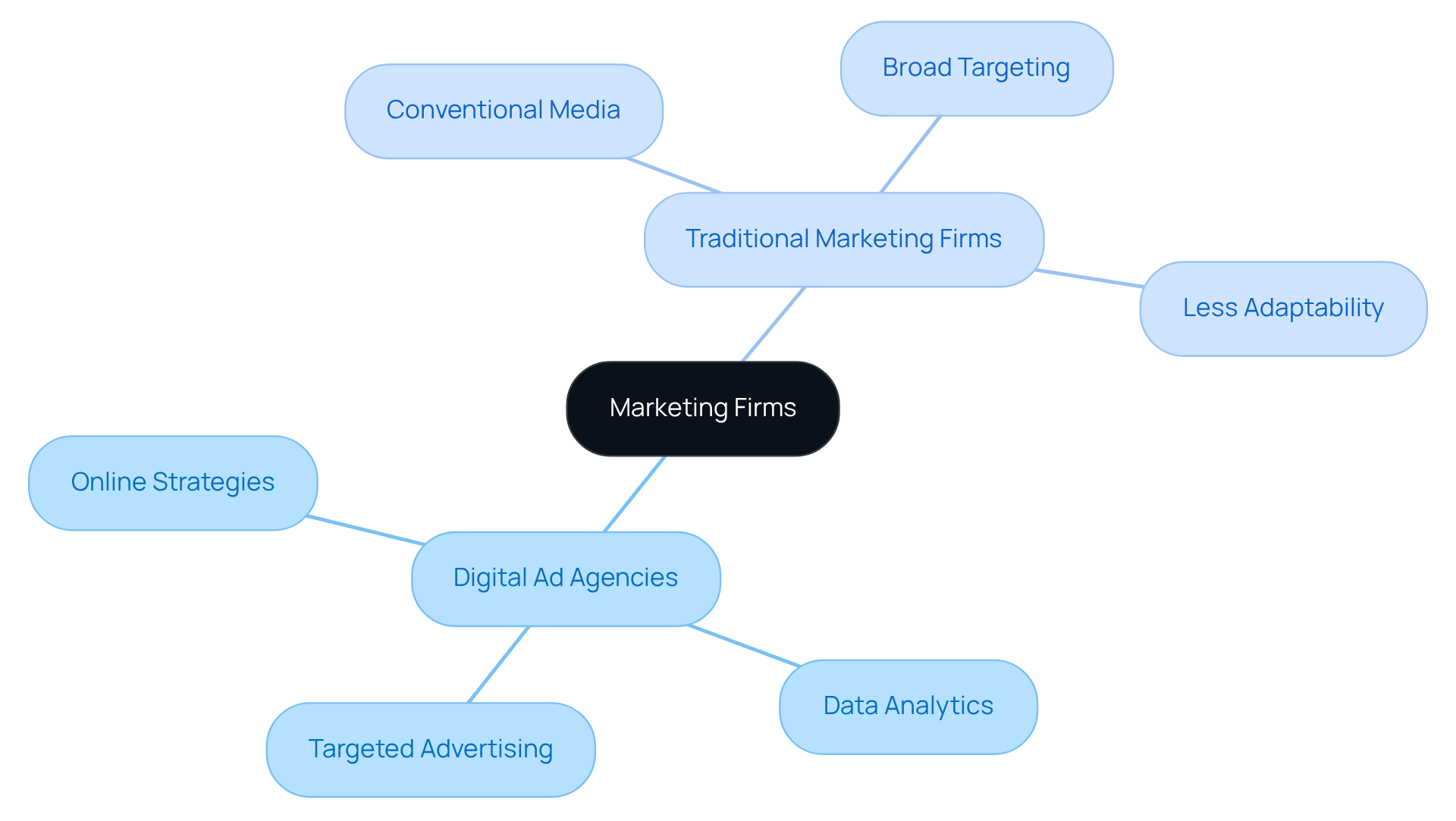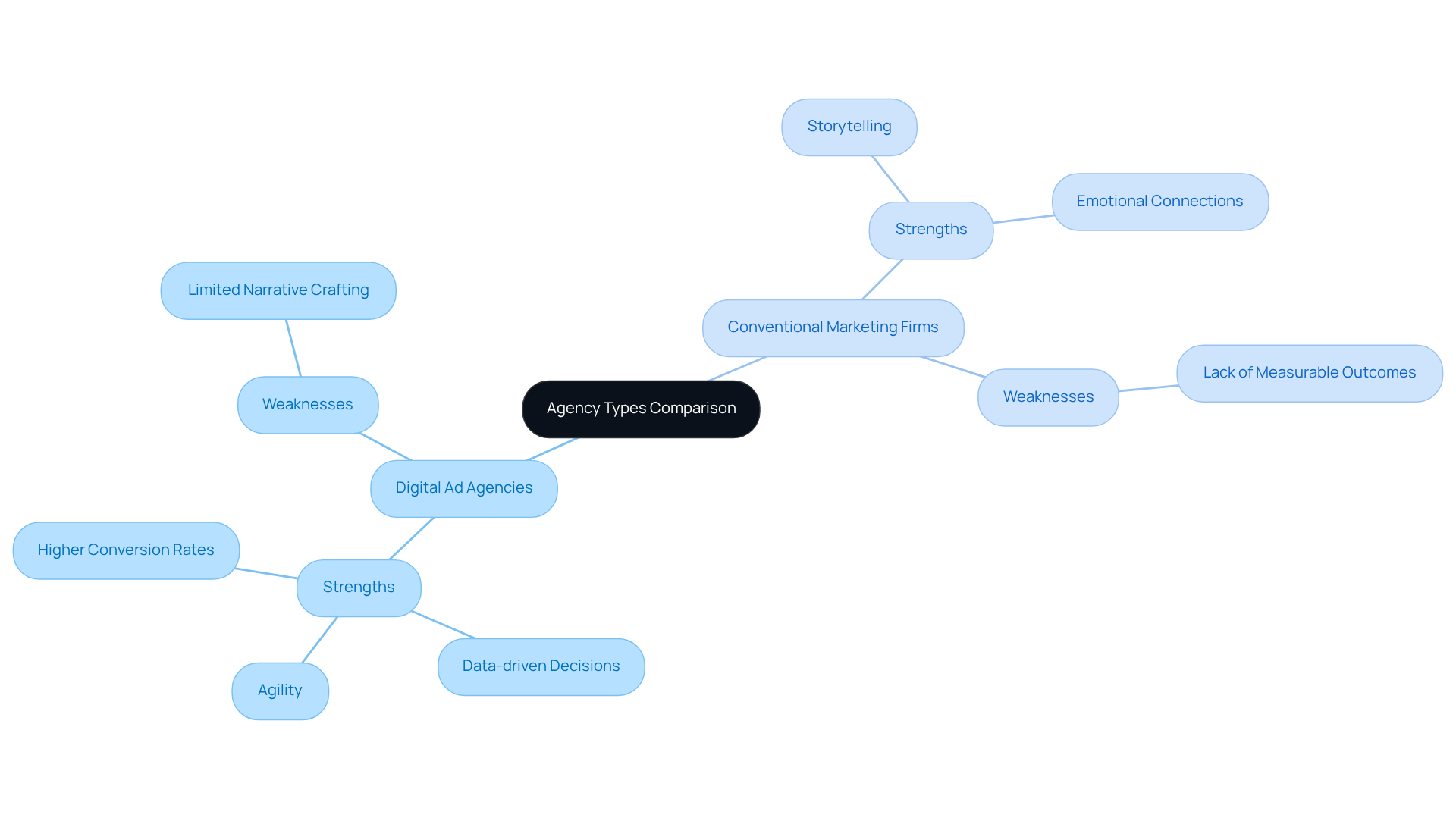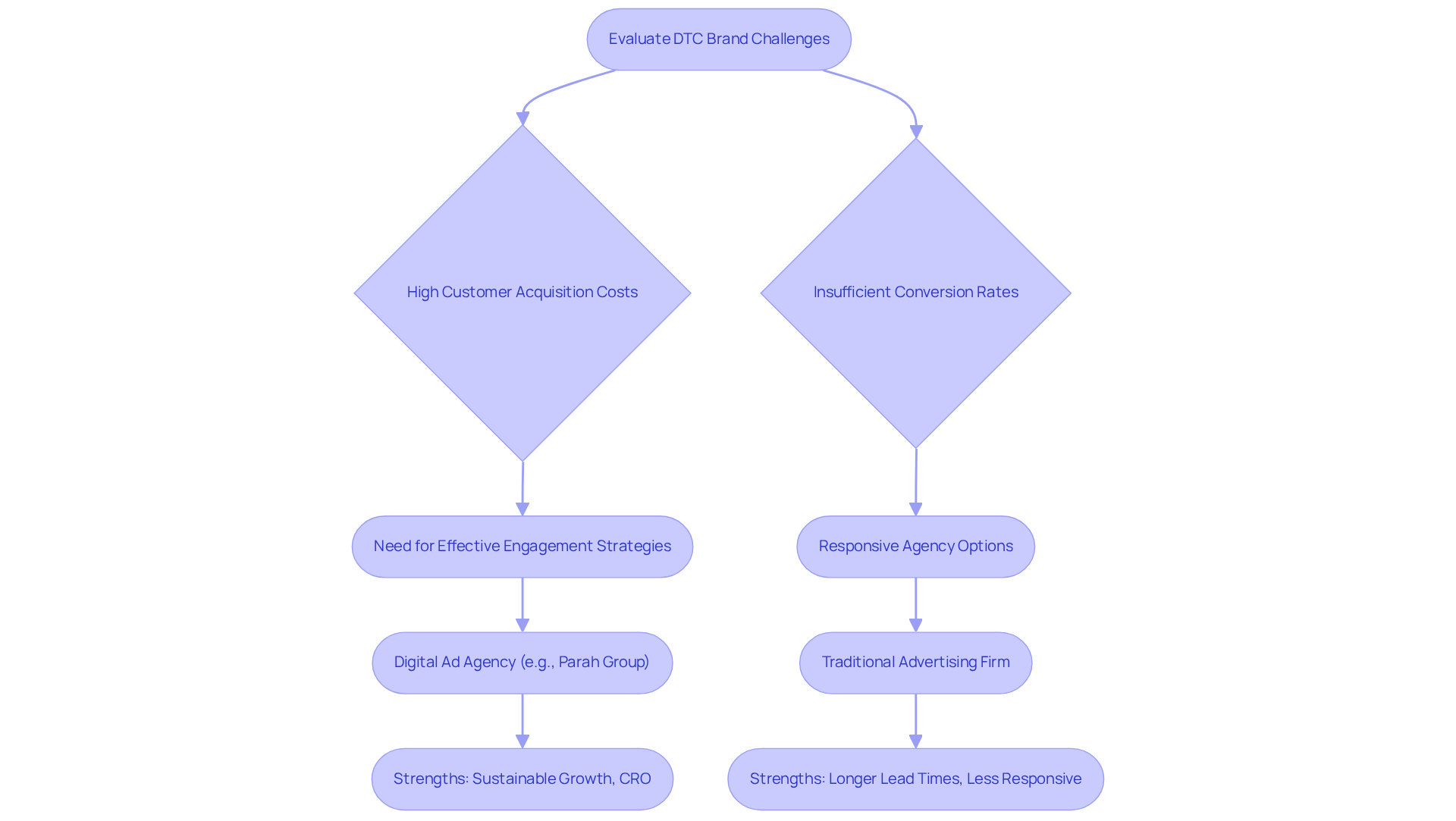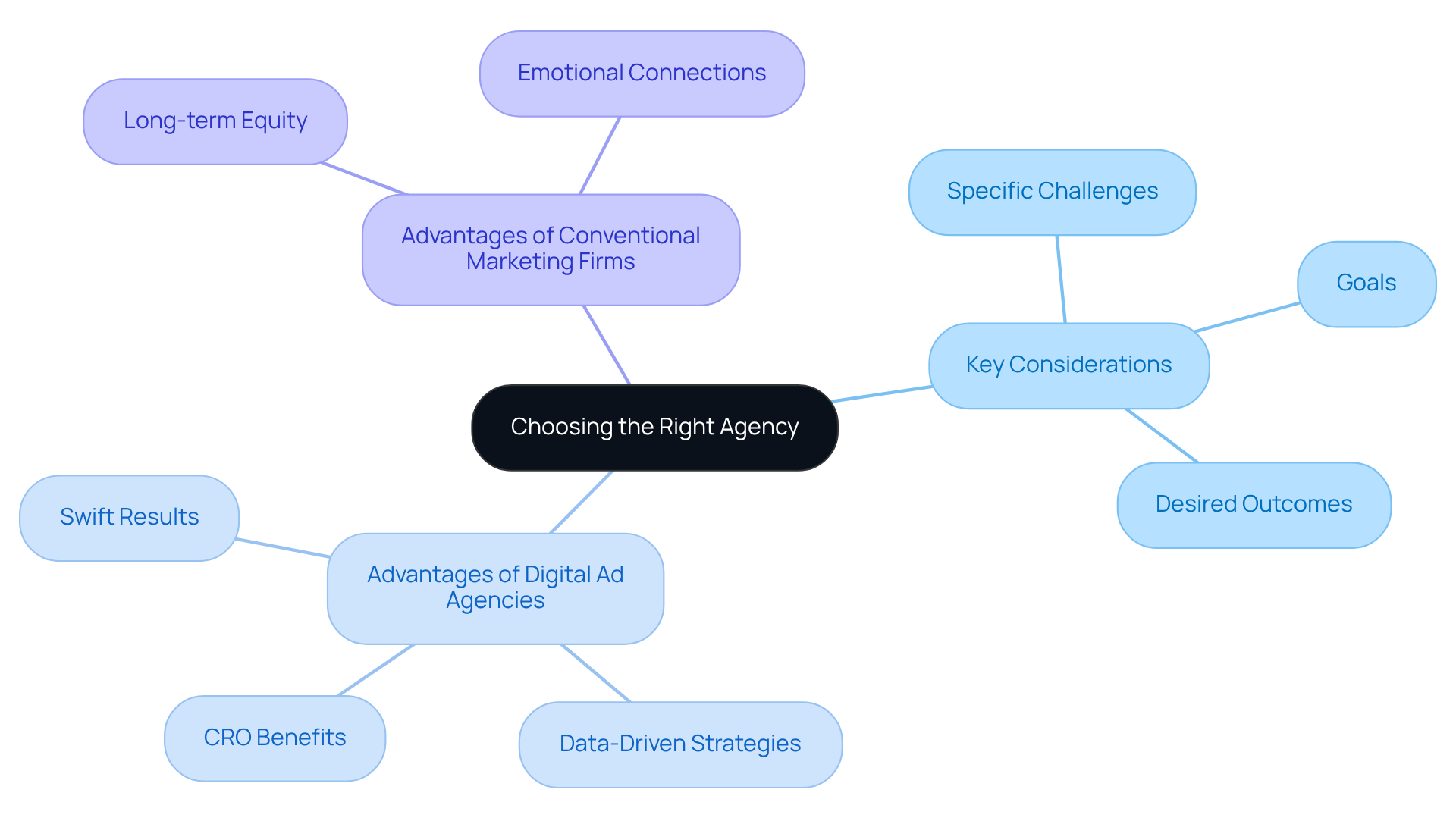
Overview
Digital ad agencies are particularly well-suited for DTC brands, thanks to their data-driven strategies that yield swift and measurable results. This capability is crucial for tackling challenges such as rising customer acquisition costs. Notably, digital agencies excel in:
- Conversion Rate Optimization
- Real-time campaign adjustments
These factors lead to significant enhancements in conversion rates and ROI. In contrast, traditional marketing firms often struggle with adaptability and delivering immediate outcomes. Thus, the choice is clear: for brands seeking to thrive in a competitive landscape, partnering with a digital ad agency is not just advantageous; it is essential.
Introduction
The marketing landscape is experiencing a profound transformation, with digital ad agencies emerging as pivotal contributors to the success of direct-to-consumer (DTC) brands. These agencies harness advanced technology and data analytics to craft targeted, real-time campaigns that connect with consumers in ways that traditional marketing firms often find challenging.
As DTC companies confront rising customer acquisition costs and the imperative for swift adaptability, a critical question arises: which approach is more effective in fostering growth and engagement?
This article explores the distinct strengths and weaknesses of digital ad agencies compared to traditional marketing firms, providing essential insights that empower DTC brands to make informed decisions regarding their marketing partnerships.
Defining Digital Ad Agencies and Traditional Marketing Firms
Digital ad agencies are at the forefront of online promotional strategies, effectively engaging consumers by leveraging platforms such as social media, search engines, and email. They harness data analytics and SEO to refine campaigns in real-time, facilitating targeted advertising that adapts swiftly to market dynamics.
In stark contrast, traditional marketing firms often rely on conventional media channels like television, radio, and print. Their strategies typically focus on broad audience targeting and awareness campaigns, which may lack the necessary adaptability to respond to rapid market changes.
This distinction is critical for DTC companies; partnering with digital ad agencies that embrace a digital-first approach can significantly amplify growth potential. Marketing specialists underscore that the effectiveness of digital strategies lies in their ability to engage customers at various stages of the purchasing process. Thus, it becomes essential for companies to choose partners who prioritize and innovative tactics.

Comparing Strengths and Weaknesses of Each Agency Type
Digital ad agencies are characterized by their agility and a strong reliance on data-driven decision-making. This enables them to make swift adjustments to campaigns based on real-time performance metrics. Such adaptability frequently yields quantifiable results, including higher conversion rates and impressive ROI—critical factors for [DTC companies](https://parahgroup.com) navigating competitive markets, especially when collaborating with digital ad agencies. For example, email promotion alone can achieve an ROI of $36 for every $1 spent, effectively showcasing the power of digital strategies.
However, these organizations may occasionally face challenges in crafting expansive narratives and emotional connections that traditional companies excel at. Conventional marketing firms leverage storytelling to forge engaging identities, cultivating strong emotional ties with consumers. Yet, their campaigns often lack the immediacy of , which can be a drawback for DTC companies focused on rapid returns. Each category of service offers unique benefits and drawbacks, underscoring the necessity for companies to align their service selection with specific business goals and desired outcomes.

Evaluating Agency Suitability for DTC Brand Challenges
DTC companies frequently face significant challenges, such as soaring customer acquisition costs, which have surged by nearly 60% over the past five years, alongside insufficient conversion rates. This scenario necessitates the implementation of effective customer engagement strategies. Expert digital ad agencies, such as Parah Group, excel in Conversion Rate Optimization (CRO), emphasizing sustainable growth and profitability. By enhancing websites to increase conversions, Parah Group empowers companies to convert a greater number of visitors into clients, addressing the critical need for efficient marketing investments. For example, one DTC brand experienced an impressive eightfold increase in conversions after overhauling their website and leveraging personalized landing pages, illustrating the substantial impact of strategic enhancements. Furthermore, allows agencies to customize strategies that resonate with consumers, thereby improving overall engagement.
Conversely, traditional advertising firms often struggle to deliver the same level of responsiveness. Their campaigns typically demand prolonged lead times and may not adapt swiftly to market fluctuations, potentially hindering a company's ability to seize urgent opportunities. As customer acquisition costs continue to rise, digital ad agencies are increasingly in demand for flexible promotional solutions. Consequently, DTC companies must meticulously evaluate their immediate needs and long-term objectives when selecting the type of agency that will best facilitate their growth and profitability.

Key Takeaways for Choosing the Right Agency
When selecting between digital ad agencies and a conventional marketing firm, DTC companies must conduct a thorough assessment of their specific challenges, goals, and desired outcomes. Digital ad agencies excel in delivering swift, quantifiable results through data-driven strategies, making them particularly suitable for companies focused on enhancing performance and monitoring key performance indicators (KPIs). Furthermore, the long-term advantages of Conversion Rate Optimization (CRO) are substantial; its benefits can extend for months, unlike ad spend, which ceases as soon as payments stop.
Key considerations for DTC companies include the agency's ability to align its strengths with the brand's objectives. For instance, organizations that demonstrate a track record of measurable results—such as improved conversion rates and increased customer lifetime value—can provide a competitive edge. Success stories from DTC companies that have partnered with digital ad agencies reveal significant improvements in metrics like return on ad spend (ROAS) and customer acquisition costs (CAC), underscoring the efficacy of targeted digital strategies.
Conversely, conventional marketing agencies often prioritize building long-term equity and fostering emotional connections with consumers, which can be crucial for brands aiming to establish a lasting market presence.
Ultimately, the decision hinges on the entity's unique circumstances, including its market position, , and growth ambitions. By prioritizing agencies that deliver customized solutions and maintain a clear focus on measurable outcomes, DTC brands can ensure they are well-prepared to navigate the complexities of the modern marketing landscape.

Conclusion
The distinction between digital ad agencies and traditional marketing firms is pivotal for DTC brands seeking to optimize their marketing strategies. Embracing a digital-first approach can significantly enhance growth potential, as digital ad agencies leverage data-driven tactics to engage consumers effectively across various online platforms. This adaptability not only allows for real-time adjustments to campaigns but also ensures that companies can respond swiftly to market dynamics, ultimately driving better results.
Throughout this discourse, key insights have been highlighted, showcasing the strengths and weaknesses of both agency types. Digital ad agencies excel in delivering measurable outcomes and swift results, making them ideal for brands focused on performance metrics and conversion rates. In contrast, traditional marketing firms often prioritize storytelling and emotional connections, which can be beneficial for brands aiming to build long-term consumer loyalty. The choice between these two approaches hinges on the specific challenges and goals of DTC companies, emphasizing the importance of aligning agency capabilities with business objectives.
As the marketing landscape continues to evolve, DTC brands must remain vigilant in evaluating their options. The rising customer acquisition costs and the demand for effective engagement strategies necessitate a thoughtful selection process. By prioritizing agencies that offer customized solutions and measurable results, brands can navigate the complexities of modern marketing with confidence. Ultimately, the right agency partnership can serve as a catalyst for sustained growth and profitability in an increasingly competitive environment.
Frequently Asked Questions
What are digital ad agencies?
Digital ad agencies specialize in online promotional strategies, engaging consumers through platforms like social media, search engines, and email. They utilize data analytics and SEO to refine campaigns in real-time and facilitate targeted advertising.
How do digital ad agencies differ from traditional marketing firms?
Digital ad agencies focus on online platforms and data-driven strategies, allowing for quick adaptation to market changes. In contrast, traditional marketing firms rely on conventional media channels such as television, radio, and print, often targeting broader audiences with less adaptability.
Why is the distinction between digital ad agencies and traditional marketing firms important for DTC companies?
The distinction is crucial because partnering with digital ad agencies that adopt a digital-first approach can significantly enhance growth potential for Direct-to-Consumer (DTC) companies.
What factors contribute to the effectiveness of digital marketing strategies?
The effectiveness of digital marketing strategies lies in their ability to engage customers at various stages of the purchasing process, emphasizing the importance of data-driven decision-making and innovative tactics.
What should companies consider when choosing a marketing partner?
Companies should prioritize partners who focus on data-driven decision-making and innovative strategies to ensure effective engagement with consumers.
FAQs











